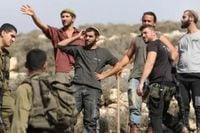On Thursday, August 28, 2025, the quiet hills northeast of Ramallah were shattered by yet another violent episode in the ongoing conflict between Israeli settlers and Palestinian villagers. According to WAFA and corroborated by ILKHA, a group of Israeli settlers descended upon Palestinian shepherds near the Ein Samia area, just east of Kafr Malik village, in a brazen daylight attack that left one man injured and nearly 300 sheep stolen.
The shepherds, Khaled Ghneimat and Mustafa Rabie, were tending to their flocks when the settlers arrived. As recounted by both news agencies, the confrontation quickly turned violent. Mustafa Rabie, in a desperate attempt to shield his sheep from theft, was physically assaulted. The settlers made off with the livestock—an act that goes far beyond the loss of property, striking at the very heart of the community’s livelihood and sense of security.
The situation escalated further when, after the attack, an ambulance was dispatched to assist the injured Rabie. However, Israeli occupation forces stationed at the Ein Siniya checkpoint north of Ramallah blocked the ambulance, preventing it from transporting the wounded man to medical care. At the time of reporting, no information had been released regarding his health condition, leaving family and neighbors anxiously awaiting news. This act of obstruction has sparked outrage among local residents and humanitarian observers alike, who see it as part of a broader pattern of systemic denial of basic rights and services to Palestinians living under occupation.
The violence did not end there. On the same day, settlers also targeted the nearby village of Taybeh, east of Ramallah, further escalating tensions across the region. These attacks form part of a relentless campaign of intimidation and dispossession that Palestinian communities have endured for years, with a marked intensification since the escalation of Israel’s military campaign in the Gaza Strip.
According to data compiled by the Wall and Settlement Resistance Commission and cited by both WAFA and ILKHA, the past month alone has seen a staggering 1,201 attacks documented against Palestinians and their property in the West Bank. Of these, 1,322 incidents were perpetrated by the Israeli occupation army, while 466 were carried out by settlers. These figures starkly illustrate the scale and frequency of violence that has become a grim routine for many Palestinian villagers.
For the residents of Kafr Malik and Taybeh, the theft of 300 sheep is more than just a criminal act—it is an existential blow. Livestock represents not only economic stability but also a way of life passed down through generations. The sheep belonged to Ghneimat and Rabie, both of whom rely on herding for their families’ sustenance. The loss, coupled with the physical assault on Rabie, has left the community reeling and has heightened fears of further attacks.
Local activists and residents have called for international intervention, urging global bodies to hold perpetrators accountable and to provide protection for Palestinian communities. As reported by ILKHA, the attack is seen as emblematic of a broader strategy of settler colonialism and systemic oppression, aimed at displacing Palestinians and seizing their land and resources. "The resilience of Palestinians in the face of such aggression remains unwavering as they continue to defend their rights and livelihoods," ILKHA noted, capturing the defiant spirit that persists despite mounting hardships.
The repeated obstruction of medical aid, such as the incident at the Ein Siniya checkpoint, has become a particularly contentious issue. Human rights organizations have long criticized such practices, arguing that they violate international humanitarian law and further endanger civilian lives. In this latest case, the delay in medical attention for Rabie has added another layer of trauma to an already devastating event.
These attacks are not isolated incidents. Over the past years, Palestinian villages and towns east of Ramallah have been subjected to repeated assaults by both settlers and occupation forces. Residents describe a climate of constant fear, with many reporting that violence tends to spike in tandem with major military operations elsewhere, such as the ongoing Israeli campaign in Gaza. This pattern has been meticulously documented by the Wall and Settlement Resistance Commission, whose monthly reports serve as a somber ledger of the conflict’s toll on ordinary lives.
Meanwhile, the broader humanitarian situation in the region continues to deteriorate. The Ministry of Health in Gaza recently reported that the death toll from Israel’s ongoing aggression has risen to 62,966, with women and children comprising the vast majority of victims. Medical sources also confirmed that, in the past 24 hours alone, four Palestinians—including two children—have died from starvation and malnutrition, underscoring the severity of the crisis.
The international community has been slow to respond decisively to these developments. While there have been calls for investigations and increased oversight, Palestinians on the ground say that meaningful protection and accountability remain elusive. The sense of abandonment is palpable, yet so too is the determination to persevere. As one local activist put it, "We will not leave our land, no matter what they do. Our roots here are deeper than any fence or wall."
For now, the villagers of Kafr Malik and Taybeh are left to pick up the pieces, counting their losses and bracing for what may come next. The stolen sheep, the injured shepherd, and the blocked ambulance have become symbols of a much larger struggle—one that continues to play out in the fields, hills, and checkpoints of the West Bank every day.
As the sun sets over Ramallah, the scars of Thursday’s violence remain fresh. Yet even in the face of such adversity, the resolve of those affected endures. Their story serves as a stark reminder of the human cost of conflict and the urgent need for justice, protection, and peace.

